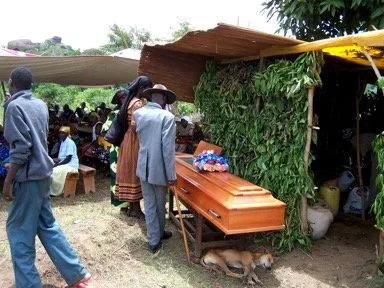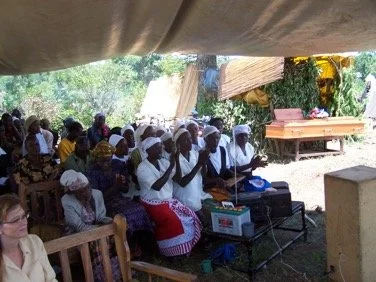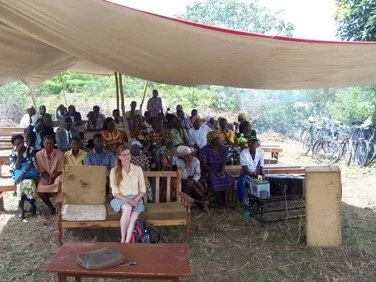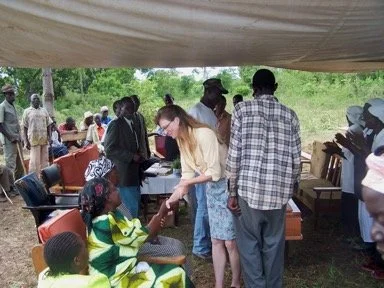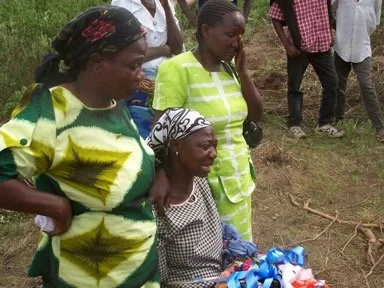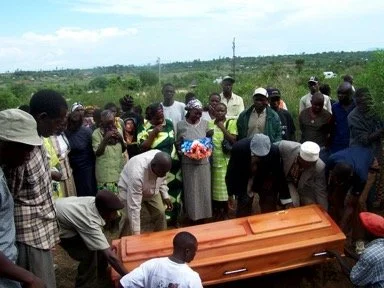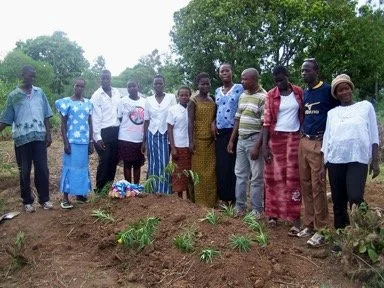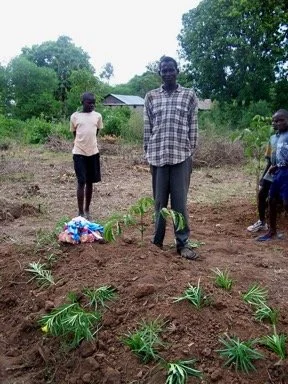Eric’s Funeral in Three Acts
About the Far Porch: Years ago, I spent time living and working in Kenya, gathering stories about community, grief, and the moments that bind us. These reflections first appeared in my blog and my book Poverty & Promise. I’m sharing them here again on Porchlight Press to remind us that the far porch isn’t so far when we stand with each other through the hardest things.
Why I’m Sharing This Now: I still think about Eric’s funeral — how it held sorrow, joy, injustice, faith, violence, and quiet kindness all in one day. How it forced me to see how the living carry the dead forward, one tree planted, one photo taken, one awkward meal at a time. This is the kind of story that shapes you forever — and reminds me why we should never look away.
Act One: Getting There
Eric is from Seme, a community about forty minutes by matatu from Kisumu. Lake Victoria is visible for much of the ride. I meet Walter at 10:25 in downtown Kisumu and we walk to the matatu station. He carries a bouquet of fresh flowers with ribbons, placed tenderly in a plastic bag and sprinkled with water.
On the way, we pass through Jomo Kenyatta Park to use the public restrooms. It’s the first time I’ve walked through this central city park and I don’t want to leave. A long white building housing a restaurant under green and white awnings sits across the expansive, very green lawn — reminding me of the elegant horse track in Saratoga Springs, New York. Reminding me of prosperity and leisure — two things I sometimes forget exist. That restaurant, with its huge patio overlooking the lawn, would be perfect for drinking a cold Coke or a beer and writing.
Walter greets an older man — a friend of his late father, who was a political activist in Kisumu. Walter says politicking is in his blood, having grown up watching his dad. He tells me President Kibaki is visiting West Africa today and will be near Seme, where the funeral is being held.
Kenya’s President Kibaki was the great hope for Kenyans when he and his rainbow coalition were elected in 2002. They promised to stop corruption. Some progress has been made. But there’s much left to do, and people feel corruption is still just as bad — or could return to the extreme at any time. Each day, the newspaper headlines call for Kibaki to dismiss his cabinet.
We cross to the market opposite the matatu station, where Walter buys two tiny trees for 50 shillings total. He’ll plant them near Eric’s grave. A street boy shadows me; Walter, without a word, hands a Coke vendor 20 shillings and points to the boy, who takes the Coke gladly.
We wait about twenty minutes for the matatu to fill up, then drive north around the lake. Seme sits next to Kit Mikaye, a giant natural rock sculpture of three huge, stacked stones. Kit Mikaye means “first wife,” and the structure does resemble a woman — large, powerful, dominating the husband’s other wives.
We alight at Kit Mikaye, along with Tom from Nyalenda, and walk back along the red dirt highway until we hear music. About two hundred yards from the road, a red tarp is strung between trees, and energetic, modern music bounces out to meet us — as if there’s a festival in the bush.
Mama Eric once had a mud house here, but it crumbled. Now only bits of wall enclose bushes where rooms once enclosed people. A temporary “house” has been built from tree branches and grasses. In the doorway stands Mama Eric. Just outside the hut, Eric rests in his coffin, a woven mat protruding from the roof to shade Eric’s glass-encased face.
A scrawny dog sleeps in the shadow of the coffin. We stop to view Eric through the glass in his coffin. Walter says a prayer.
Though only twenty-six, Eric looks like an old man. He died eleven days ago. His family didn’t have the money for a coffin or to transport his body from Kisumu, so the funeral was postponed, while Eric lay waiting in the city morgue.
We step under the tarp and are ushered to the front — the very front — where cushioned couches wait. Taking the most comfortable seat doesn’t feel right, but they insist on the mzungu (white person) sitting up front and I don’t want to offend. I actually want to melt, invisible, into the furniture — but that doesn’t happen. Could never happen.
Several guys from Nyalenda are there, and we shake hands. Walter drifts off to photograph Eric. As I sit, looking out at Kit Mikaye across the field and highway, I hear a toy whistle blowing — incessant. Wondering if it’s part of the ceremony, I look up to see a tall, thin young man, clearly drunk, stumbling through the dusty bush toward the tent. He grins and stops in front of me — but he doesn’t really stop, because his head and shoulders keep moving in circles. He shakes my hand and speaks in Luo. A lady behind me throws a stick at him to scare him away. His dirt-caked hand leaves soil in mine. He jerks off, blowing his whistle, dirt and dried leaves clinging to his back as if he’s fallen down recently.
The reverend presiding over the service sits up front, facing us. He’s skinny — something most old men here have in common. He wears a light blue suit of thin material. His socks, though the same color, sport different patterns: one woven with vertical stripes, the other with a fisherman’s net design.
A woman brings two faded, quart-sized Kimbo containers and sets them on the reverend’s table. Kimbo — vegetable shortening — has the tag line: For the tastiest food. She’s arranged ornamental grass in the containers. The wind lifts the tarp overhead, rattling the Kimbo containers.
The reverend keeps writing, loose-leaf papers spread on his knees. Thirty minutes later, he finishes, gets up, collects chunks of hardened earth, and breaks them against tree trunks. He empties the Kimbo containers, fills their bottoms with soil, then gently arranges the grass so it stands secure. The containers won’t be swayed by the wind again.
Act Two: Hallelujah and Amen!
At Luo funerals, friends and family speak about the deceased before the clergymen take over. Walter goes first, talking for fifteen minutes, followed by a young woman, an old woman, and finally Eric’s tiny, creased grandmother. Every word is in Luo — not one in English — though Walter occasionally whispers a translation: when to stand, when to sit.
The choir arrives, women of all ages wearing white, lacy scarves tied around their heads. They sing and clap with fervor, one solitary voice ringing out the verse while the others fold in behind. It’s lovely and uplifting.
The dog keeps coming into the circle between our front seats and the reverend’s table. At first, Walter tosses dirt clumps and sticks to shoo him away. But now the elders have arrived and the reverend says the choir will go meet them and escort them to the tent.
The choir sings and claps, moving in step to the beat. As they surround the elders, headed our way, the reverend — just behind me — draws back his foot and kicks the dog’s rear. A shriek and a howl. I jump. The dog runs. I feel the poor animal’s shock in my bones.
Seven elders stand before Eric, serenaded by the choir. The main elder lifts both hands, a Bible in his left, and shouts a prayer up to the mat shading Eric. Young men lift the coffin and carry it under the tarp, lowering it onto a coffee table in front of us. The ground is uneven; a stick props up one leg of the table.
Now Eric is with us — only inches away. His mother weeps.
Each preacher gets up to deliver a sermon. Every word in Luo. The choir sings between them. Then one man — short, with blue shirt sleeves and a Ford belt buckle — leaps up, his worn Bible wrapped in bright yellow oil cloth. He shouts so loudly I flinch; spit flecks my face and knees. His veins bulge — then his face goes slack, his mouth curves into a slight smile, and he says, “Hallelujah.”
The crowd responds: “Amen.”
Each time I think he’ll burst, he pauses, grins that small grin — Hallelujah. Amen.
I want to walk away. Part of me wants to stand and protest — to step out of his performance. But I sit quietly while my mind screams ‘sit down!’ I close my eyes as the choir rocks and women clutch their faces, speaking individual prayers.
Finally, the short preacher finishes, steps back. Mama Eric stands to speak, a heavyset woman bracing her elbow. Her grief slaps me like the reverend’s foot on the dog’s backside. Tears roll down my cheeks.
She says the word mzungu again and again. Later, Walter explains: Kenyans see white people as people who keep their promises. If a mzungu says they’ll do something, they do it. Mama Eric compared her son to a mzungu. Every time he said he’d do something for her, he did.
Her voice catches. She sobs — then steadies herself as the woman beside her begins to sing, the choir joining in to lift her back to her feet.
A young man I know from Nyalenda, in a spotless white shirt and dark slacks, stands to speak in English. “There is someone here today who cannot understand anything being said in Luo.” The women shout at him, telling him to speak in Luo. He switches back and forth, then turns to me. He thanks me for coming — for everything I’ve done. Too late for melting into the furniture. I’m ashamed to be thanked for simply showing up.
He asks me to greet the crowd. I stand, turn — more than two hundred faces turned up toward me. I see compassion. I see curiosity. I tell them I’m honored to be there, saddened I didn’t know Eric, but grateful to learn about him through them. I thank them for allowing me to stand with them on such a sacred day.
My words are translated into Luo.
Act Three: Into the Ground
It’s time for contributions. The choir sings. A plastic bowl is placed in front of Eric’s coffin. Everyone lines up to pass by, dropping in coins and folded bills.
When the last song fades, young men lift the coffin to carry it twelve feet to the grave. They scramble, gripping homemade handles. They lower the box into the narrow hole — bracing feet against dirt walls, tilting the coffin inch by inch. It’s never smooth.
Mama Eric sits in a chair by the grave, the bouquet in her lap, her ever-present friend at her side. As the coffin settles, shovels swing. Dirt rains down, red dust speckling her dress. Women wail, leaning into the choir’s rhythm, speaking agony between sobs.
The small preacher with the Ford belt buckle is suddenly at my side, grinning, pumping my hand.
“We heard there was going to be a white man here today,” he says, beaming. The whistle blows behind him — the drunk man again. “You come to preach God’s word?”
“No,” I say. “I’m a volunteer at a college.”
Behind him, the drunk man tries to join the men with shovels. They brush him away. Dirt piles high. Walter and the Nyalenda boys plant the saplings. They bend low, pressing roots into the fresh grave soil. Walter says a prayer for prosperity.
The preacher leans in again, urging me to visit his church — A mzungu draws a crowd, he tells me. The drunk man breaks branches from a bush, pokes them into the dirt mound, stands back to admire his work. The bouquet is laid at the grave’s head. These are Eric’s markers.
They’ll wilt soon.
Photos. More photos. Elders, young people, Mama Eric. Heads pressed together to see the tiny screen. They laugh, just for a moment. The drunk man tries to slip into one frame, gets slapped across the neck. I freeze — too shocked to breathe. Walter leans over, shrugs: “That’s the African way.” He invites the drunk man to stand for his own photo by the grave. He does, smiling.
It’s time to eat. We walk to a cluster of houses. Under a huge, spreading tree, couches are arranged in a square. Thirty men from Nyalenda gather, drinking. Walter and I sit alone in a small house across the way. A young man brings us a tray: fried calf liver, dried fish, cabbage, ugali, stewed chicken, rice, goat. We wash our hands and eat with our fingers. It’s good. I’m grateful.
Back on the road, matatus are full of people who came to see the president. Soldiers pass in trucks, helicopters buzz overhead. We squeeze in. The matatu stops in a town I know — George’s hometown. I step out, scanning the dusty street, and there he is. George. He looks up, sees me immediately. We wave. “Where are you coming from?” he calls.
The matatu driver shouts at me to get back in. “I was looking for you,” I yell. “See you Monday.”
I watch George turn behind a house. He turns back once more before he disappears and I’m watching him, too, a lovely sight to soothe the long day’s grief.
In Seme that day, grief and life tangled up like roots in the red clay. I remember Eric’s mother, the boys bracing the coffin, the tiny trees standing in the soil. Sometimes you can’t fix a thing. But you can stand there, eyes open, heart steady. And you don’t look away.
About the Author
Cindi Brown is a Georgia-born writer, porch-sitter, and teller of truths — even the ones her mama once pinched her for saying out loud. She runs Porchlight Press from her 1895 house with creaking floorboards and an open door for stories with soul. When she’s not scribbling about Southern music, small towns, stray cats, places she loves, and the wild gospel that hums in red clay soil, you’ll find her out listening for the next thing worth saying.

